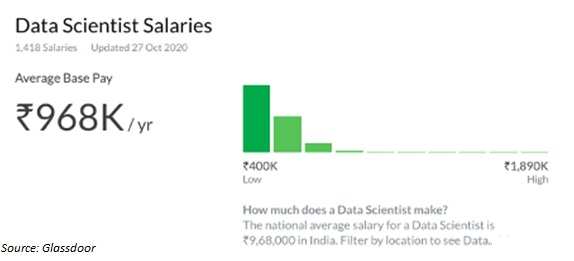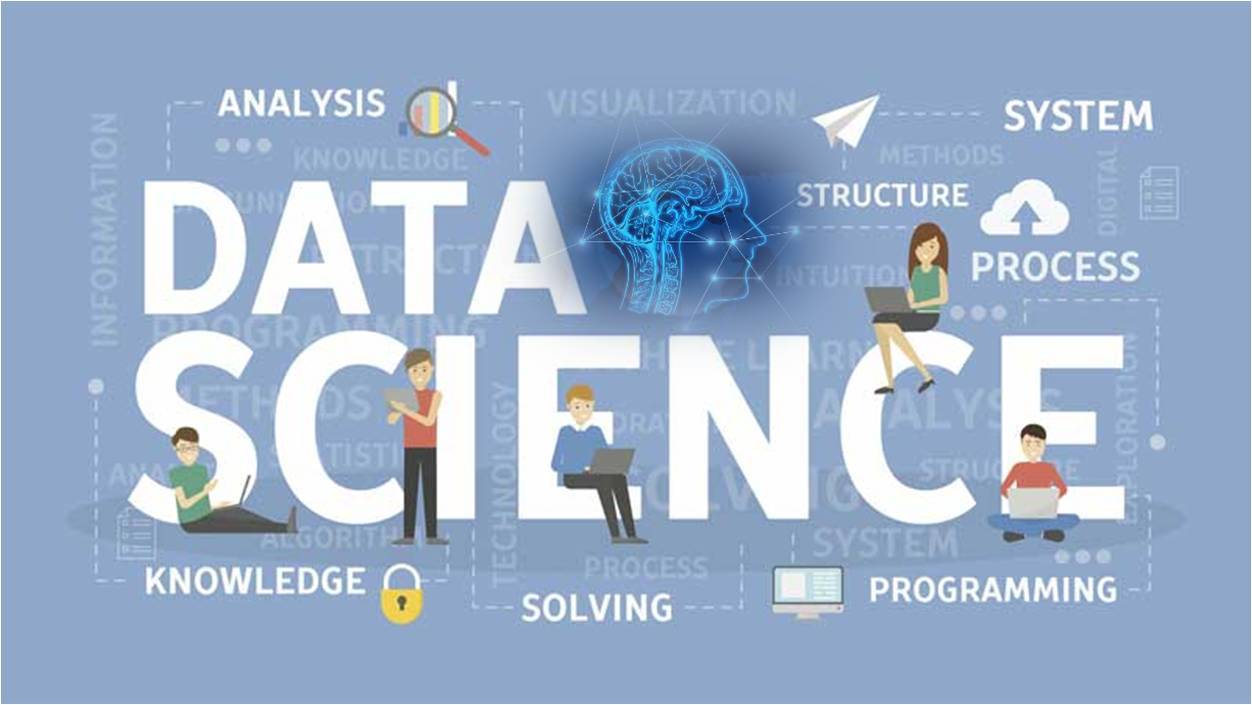A low-down on Data Science courses and its prerequisite skills
Data Science has been named the ‘Hottest Job of the 21st century’ by Harvard and it is rightfully so. With the rapid rise of big data in every industry, the demand for data scientists have catapulted. According to an article by The Economic Times, India has seen more than 400% rise in demand for data science jobs across varied industry sectors. If you want to be a part of this thriving market, then this is the right place to get started. In this article, we’ll dive deep into how you can go about doing a data science course, including what you need to get started.
Why do a Data Science course?
Before looking at why you should learn data science, let’s take a step back and begin with a refresher on data science. To put it simply, data science is the extraction of actionable insights from raw data. It is an amalgamation of multiple disciplines and often requires skills from data engineering and mathematics to statistics and advanced computing. A data scientist, therefore, has to be armed with the right skills to be able to sift through massive amounts of data to communicate information that will drive efficiency.
If the idea of being surrounded by data, computing, and making logical conclusions interests you, then a data science course is the best way forward to put your interests to action. If you think Artificial Intelligence (AI) is the future, then data scientists are holding the ropes.
Especially in the subfields of machine learning, AI is used extensively to create models and predictions by using advanced algorithms. Take Tinder, for example, the data scientists at this popular dating app use carefully crafted algorithms from their data to ensure that users are shown profiles that are closest to their ‘types.’ The algorithm analyses swiping patterns of users and based on the history of their preferred profiles, pushes relevant singles to increase the probability of a match.
Now that’s smart use of data. The data scientists at Tinder adopted predictive analytics to arrive at their suggestions, what are the other methods of data interpretation? Let’s take a look at the finer details, this should also prepare you of what to expect in your data science course.
How does a Data Scientist deal with Data?
While Data Analysts also make sense of raw data by processing its history, data science, analyses it to make decisions and predictions. This can be done through:
Predictive Analysis – Predictive analysis as the name suggests involves interpreting the data to make predictions of a particular occurrence/event in the future. UberEats uses predictive analysis to predict how soon hot food can be delivered to the customer based on traffic patterns and peak-hour bookings.
Prescriptive Analysis – Using data to create intelligent models that are capable of making their own decisions and run intelligently is prescriptive analysis. The key difference between predictive and prescriptive analysis is that while predictive analysis helps predict an outcome, prescriptive analysis suggests how to take action to achieve the predicted outcome.
Google Maps works on prescriptive analysis, having made a prediction on the ETA to a particular location, it also tells you how to get to the location from wherever you are, even rerouting you in case you head in the wrong direction.
Machine Learning – Using data to create algorithms that will allow a machine to predict and act falls under Machine Learning. It involves supervised training that enables the machine to analyse the data available and take consequent intelligent action.
Tesla’s self-driving cars work on machine learning. The car gathers data to chart future paths and has been trained to learn to take actions like slowing down at stop signs or busy junctions.
Machine learning also involves identifying hidden patterns in the data. In this case, the machine does not require to be closely supervised; it only learns to group similar patterns together.
Theory aside, let’s explore what the practical data science career path offers.
What does the market look like?
As you may have gathered by now, data science and its use has seeped into every aspect of modern life. Right from the Finance & Marketing industries to Pharma companies and Banks, data science is so widely adopted that IBM predicts that the demand for data scientists will soar by 28% in 2020 alone.
In a report published by IBM and Burning Glass Technologies, Business-Higher Education Forum (BHEF), it was found that data science jobs are among the most challenging to fill and that employers are willing to pay premium salaries for professionals with expertise in these areas.
| Skill Name | Predictive 2-year Growth |
| Data Science | 93% |
| Machine Learning | 56% |
| Tableau | 52% |
| Big Data | 50% |
| Data Visualisation | 44% |
| R | 41% |
| Apache Hive | 41% |
| Predictive Analytics | 39% |
| Apache Hadoop | 35% |
| Pivot Tables | 34% |
Source: IBM
The average salary of around INR 9,00,000 per annum in India makes it one of the most well-paying jobs.

With a promising market in place, all you need to do is enrol into the right data science course to get you started. Here’s a look at the data scientist skills that are a prerequisite.
What skills will you need?
Typical skills required for a data scientist fall under three broad categories – Educational Skills, Technical Skills, and Non-Technical Skills.
1. Educational Skills
To become a data scientist, one must be skilled in mathematics, computer sciences, and statistics. An academic background is a great way to learn and build on the foundational skills required.
A data scientist ideally has a Bachelor’s Degree in Computer Science, Mathematics, and Statistics. Many data scientists also have a Master’s Degree or PhD in the field of Data Science, Mathematics or related fields further building on their skills.
Specialised courses in Data Science will help you with the skills and the certification you need to pursue a successful career. Spingboard’s Data Science Career Track helps you master the foundations of data science and even choose between advanced machine learning, natural language processing, or deep learning as your area of focus. The personalised mentoring along with a hands-on approach will help you gain some valuable practical experiences.
2. Technical Skills
While anyone who deals with data science must be skilled in data visualisation, data intuition, and software engineering, here are some of the other skills that are an equally important prerequisite.
Machine Learning:
Handling huge amounts of data to allow a product to act on its own is no small feat. This involves learning:
- Ensemble Learning (Random Forests, Gradient Boosting)
- Scikit-learn for algorithms
- Time Series Analysis
Data Wrangling:
Dealing with imperfections in data, identifying and cleaning data is a very handy skill to learn as a data scientist.
- Pandas (to clean data)
- Excel, CSV, JSON
- SQL
- APIs (for data collection)
Mathematics & Statistics:
The foundation of data science involves making accurate calculations and predictions. Build skills in -
- Linear Algebra
- Calculus I
- Theory of Distributions
- Basic Statistics
- Inferential Statistics
Computer Science:
Advanced computing coupled with programming languages is an absolute must-have.
- Programming (Python, R and SQL among the commonly used)
- Fundamentals of Computing
- Discrete Mathematics
- Functional Programming
- Data Structures & Algorithms
3. Non-Technical Skills
While technical data scientist skills are important, data scientists must also possess soft skills to ensure optimal productivity and make a lasting impression in the organisations. Data scientists are tasked with creating the most complex algorithms to simplify products and solutions. A deep understanding of human behaviour along with empathy will help data scientists make meaningful contributions.
Communication:
Everyone benefits with clear and consistent communication. A data scientist, just like anyone else, must be able to simplify complex data jargons to simple business terms and everyday language to ensure the message is delivered successfully.
Going beyond the basics, data scientists must also document their processes and approach well so that it leads to better research and increased collaboration between teams. By being able to communicate the findings from the data, data scientists can help businesses solve problems more effectively.
Business-Orientation:
It is key for data scientists to understand the business they operate in. A deep understanding will result in relevant, meaningful solutions. Having a keen eye for business will also help gauge which action will yield the maximum results and similarly which ones will act like a negative domino effect, impacting the organisation drastically.
Adaptability:
Being able to learn and adapt quickly is a must for data scientists. Technology continues to grow at a rapid pace and data scientists are at the helm of it all, and thus, must be able to deliver quickly without compromising on the quality. Preparedness, agility, and determination will help you inculcate the skill of adaptability.
With a holistic view of all the data scientist skills required, you can look for courses that offer training across these various categories. Springboard’s data science course is the best place to pick up the right technical skills, gain expertise in the field and prepare for a data science career path.
The course comes with 1:1 mentor coaching and a chance to complete 14 real-life projects, including two industry-worthy capstone projects to showcase your skills to employers. Springboard’s learning programme is the only one that comes with a job guarantee. You can head to our website to go through the course curriculum in detail to check off all the skills you need.
To join us on Facebook Click Here and Subscribe to UdaipurTimes Broadcast channels on GoogleNews | Telegram | Signal




